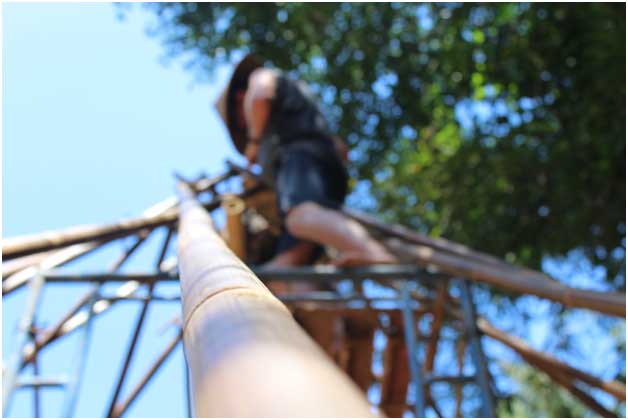Above Photo: IBUKU have helped create pioneering bamboo buildings such as the ‘Heart of School’ at Green School. Credit: INBAR
BEIJING, China, Nov 21 2019 (IPS) – How Indonesian craftsmanship is undergoing a revival at the world’s first ‘bamboo university’.
It’s fast-growing, flexible and strong. Standing underneath a bamboo canopy, it is easy to understand why people have been using this grass plant for years, in the construction of houses, bridges and scaffolding.
Bamboo has several advantages in construction, including its height, light weight, excellent tensile strength and flexibility. Critically, bamboo is also abundantly available and low cost, making it a traditional choice of housing material for many poorer communities.
Despite its many advantages, for years bamboo has been regarded as ‘poor man’s timber’: a cheaper, less resilient form of construction material. According to Orin Hardy, founder of bamboo training course Bamboo U, “There was a time when nobody would want to be seen to live in a bamboo house.”
One bamboo design company is working hard to change this perception. In the heart of the Balinese jungle, IBUKU’s fairytale headquarters offer a window into the future of bamboo construction: multi-storey, open-air housing with electricity, water and modern amenities.

Founded in 2010, IBUKU’s team of designers, architects and Balinese bamboo craftsmen have created hundreds of structures, many of which are now famous as part of the iconic Green School and Green Village.
For the last few years, IBUKU has teamed up with Bamboo U, to provide courses in bamboo construction. Bamboo U is based next to IBUKU headquarters, and offers multi-day ‘build and design’ workshops. People on the courses work with a range of architects, designers and engineers to learn more about bamboo’s properties and potential, and to help build their own bamboo structures. IBUKU provides a number of experts for each course, and invites all trainees to visit their headquarters and bamboo warehouse.
Bamboo U participants learn a lot from the IBUKU team about bamboo’s technical aspects. Although the strong, sturdy dendrocalamus asper is the bamboo of choice for much construction in Bali, IBUKU also use other species for secondary structures, or for decorative use: the wavy, irregular bambusa blumeana, for example, provides a playful addition to balcony railings. It is this willingness to work with nature which Orin hopes to inspire in Bamboo U: “It’s about creating an understanding of the place you’re in… The built environment has become so important. We need nature to be in the built environment. We’ve sacrificed all of that spontaneity and creativity in the name of function.”

 As with all parts of IBUKU’s work, Balinese bamboo carpenters have a central role to play in the selection of bamboo materials: they know which poles to pick, and how to use them. On Bamboo U courses, these craftsmen also teach participants about traditional bamboo joinery and assembly methods, using hand tools and techniques which they have used from a young age. For Orin, it’s these bamboo carpenters who “really make the magic happen”, and their interaction with course participants “is an essential part of our Bamboo U ethos.”
As with all parts of IBUKU’s work, Balinese bamboo carpenters have a central role to play in the selection of bamboo materials: they know which poles to pick, and how to use them. On Bamboo U courses, these craftsmen also teach participants about traditional bamboo joinery and assembly methods, using hand tools and techniques which they have used from a young age. For Orin, it’s these bamboo carpenters who “really make the magic happen”, and their interaction with course participants “is an essential part of our Bamboo U ethos.”
For Defit Wijaya, senior architect at IBUKU, Bamboo U’s work is an extension of IBUKU’s own aims: to show that bamboo housing is possible. He acknowledges that many people are skeptical about the safety of bamboo structures, and that only a small number of countries have bamboo construction codes. “We need to take more risks to show what bamboo can do. Here [in Bali] we have the luxury of trying this out.”
The team at Bamboo U are not the only ones to inspire people with bamboo construction. The International Bamboo and Rattan Organisation (INBAR), an intergovernmental organisation, coordinates research and demonstration projects to promote bamboo housing among its Member States.

In recent years, their work has helped to push down some of the barriers facing bamboo construction: INBAR has helped create new international standards for bamboo construction design and testing, and has formed a Construction Task Force made up of experts from around the world. Most importantly, INBAR has helped to bust the myths about bamboo construction across its network of Member States: last year, Ecuador confirmed it would integrate bamboo into its huge ‘A House for All’ programme, and in 2017, the government of Nepal approved the first design for an earthquake-resilient bamboo school.
According to Charlotte King, from INBAR, “The role of bamboo construction has never been more important. We know that around 70 per cent of global greenhouse gas emissions come from infrastructure construction and operations. Future development risks locking the world into a high-carbon pathway for hundreds of years.
“As bamboo grows throughout the tropics in Africa, Asia and the Americas, it could provide us with a natural, renewable material for infrastructure in developing countries.”

Find out more about Bamboo U training opportunities here, and about IBUKU’s work here.
Established in 1997, the International Bamboo and Rattan Organisation (INBAR) is an intergovernmental development organisation that promotes environmentally sustainable development using bamboo and rattan. It is currently made up of 45 Member States. In addition to its Secretariat Headquarters in China, INBAR has five Regional Offices in Cameroon, Ecuador, Ethiopia, Ghana and India. Find out more about INBAR here.


